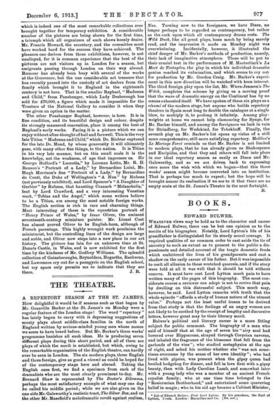THE THEATRE.
A REPERTORY SEASON AT THE ST. JAMES'S. How delightful it would be if seasons such as that begun by Mr. Granville Barker at the St. James's on Monday were a regular feature of the London stage ! The word " repertory " has lately begun to carry with it depressing suggestions of musty plays about middle-class families in the north of England written by serious-minded young men whose names we seem to have heard before. But Mr. Barker's three weeks' programme banishes all such ideas. He is producing seven different plays during this short period, and all of them are plays of which the merit is established, but which, owing to the remarkable organisation of the English theatre, can hardly ever be seen in London. The six modern plays, three English and three foreign, give as good a re8um6 as could be hoped for of the contemporary. stage here and abroad. Taking the English ones first, we find a specimen from each of the dramatists who are the most clearly prominent to-day. Mr. Bernard Shaw is represented by The Doctor's Dilemma, perhaps the most satisfactory example of what may one day he called his middle period ; while we are also given on the one side Mr. Galsworthy's realistic tract, The Silver Box, and on the other Mr. Masefield's melodramatic revolt against realism,
Nan. Turning now to the foreigners, we have Ibsen, no longer perhaps to be regarded as contemporary, but rather as the rock upon which all contemporary drama rests. The Wild Duck, like all great plays, loses much by being merely read, and the impression it made on Monday night was overwhelming. Incidentally, however, it illustrated the chief danger of Mr. Barker's methods of production, namely, their lack of imaginative atmosphere. These will be put to their crucial test in the performance of M. Maeterlinek's La Mort de Tintagiles, the play in which his individual dramatic genius reached its culmination, and which seems to cry out for production by Mr. Gordon Craig. Mr. Barker's experi- ment in this new direction will be watched with keen interest. The third foreign play upon the list, Mr. Wiers-Jenssen"s The Witch, completes the scheme by giving us a moving proof that the wave of dramatic energy on the Continent has by no means exhausted itself. We have spoken of these six plays as a resume of the modern stage, but anyone who builds repertory theatres in Spain must long to double the catalogue at a single blow, to multiply it, to prolong it infinitely. Among play- wrights at home we cannot help clamouring for Synge, for Mr. Barker himself, and among the foreigners we look in vain for Strindberg, for Wedekind, for Tchekboff. Finally, the seventh play on Mr. Barker's list opens up vistas of a still more comprehensive, still more satisfying repertory. Moliere's Le Manage Farce reminds us that Mr. Barker is not limited to modern plays, that he has already given us Shakespeare and Euripides, and that they and others will fall into place in our ideal repertory season as easily as Ibsen and Mr. Galsworthy, and so we are driven back to expressing once more the wish with which we began—that this three weeks' season might become converted into an institution. That is perhaps too much to expect ; but the hope will be brought nearer its realisation if we see to it that there are no empty seats at the St. James's Theatre in the next fortnight.
B.


































































 Previous page
Previous page